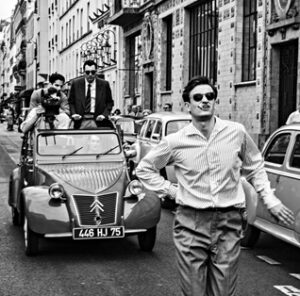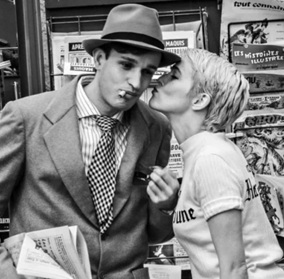Nouvelle Vague
 Just one week after the release of “Blue Moon,” his exploration of the decline of songwriter Lorenz Hart, comes “Nouvelle Vague,” director Richard Linklater’s tribute to Jean-Luc Godard’s groundbreaking 1959 film “Breathless.” Presented in French – and in glorious black and white – “Nouvelle Vague” looks a lot like “Breathless,” but it fails to show what Linklater deemed so brilliant about either Godard, his film, or the entire French New Wave movement.
Just one week after the release of “Blue Moon,” his exploration of the decline of songwriter Lorenz Hart, comes “Nouvelle Vague,” director Richard Linklater’s tribute to Jean-Luc Godard’s groundbreaking 1959 film “Breathless.” Presented in French – and in glorious black and white – “Nouvelle Vague” looks a lot like “Breathless,” but it fails to show what Linklater deemed so brilliant about either Godard, his film, or the entire French New Wave movement.
Background
During the late 1950s, several film critics who wrote for the Cahiers du cinema magazine began directing their own features. Following the success of Francois Truffaut’s revolutionary “The 400 Blows” earlier in ’59, Godard set about to make his first feature-length film with “Breathless.” The French New Wave directors challenged the accepted norms of 1950s filmmaking through the use of several innovative techniques. They eliminated establishing shots when switching from one scene to another, they used handheld cameras almost exclusively, and they employed long tracking shots to follow the movements of their characters – rather than observing that movement from afar, as was standard practice then.
These trailblazing methods gave their films an urgency and immediacy sorely lacking in Hollywood movies of the day. This style would eventually be replicated by a new generation of Hollywood directors during the late ‘60s and early ‘70s. Think Mike Nichols’ trio of “The Graduate,” “Catch-22,” and “Carnal Knowledge,” which owe their style to the French New Wave directors of a decade prior.
The cast
In “Nouvelle Vague,” Guillaume Marbeck stars as the diffident yet quietly cocky Godard, Aubry Dullin plays his hot young French star Jean-Paul Belmondo, and American actress Zoey Deutch plays Jean Seberg, who had just wrapped filming another French picture when Godard grabbed her for what began as a two-week shoot to make “Breathless” (and to infuse a genuine American star into his low-budget debut).
Rude protagonist
My issue with Linklater’s presentation of Godard is that he comes off as rude – to his stars, his producer (Bruno Dreyfurst), and anyone else who might challenge his choices. And his choices are simply baffling. The cast and crew show up on day one with no script, no staging or blocking cues, and just a very rough outline of what the scene is about. Godard shouts out his direction while the camera is rolling – under the premise that he will later edit out all dialogue from the shoot and ask his stars to then dub their lines. Some days, his shoots are finished within two hours. Other days no shooting occurs at all, and the cast simply hangs out at a local coffee shop.
Speaking in vagaries
When this approach is contested (again, by anyone), Godard speaks in philosophical vagaries so unrelated to the question as to aggravate even his staunchest supporter (his cameraman, ironically). Eventually, Seberg threatens to simply walk off the set and forego whatever paycheck she might be earning. Furthermore, Godard/Marbeck never removes his cigarette nor his sunglasses. Ever. If Godard were truly this arrogant, it’s difficult to believe he would have been regarded as one of the greatest of all French directors. For what it’s worth, Truffaut (played by Adrien Rouyard) is exhibited as nice, warm, friendly, and intelligent.
 I realize the French New Wave movement was so radical at the time that it rocked the world of cinema. The old guard hoped and prayed this newfangled style of filmmaking would never catch on and become mainstream. Its directors (which also included Agnes Varda and Eric Rohmer) were obviously not what the establishment was used to. But Linklater’s Godard is so far outside acceptable norms, we wonder what about him was supposed to be so endearing.
I realize the French New Wave movement was so radical at the time that it rocked the world of cinema. The old guard hoped and prayed this newfangled style of filmmaking would never catch on and become mainstream. Its directors (which also included Agnes Varda and Eric Rohmer) were obviously not what the establishment was used to. But Linklater’s Godard is so far outside acceptable norms, we wonder what about him was supposed to be so endearing.
No “Blue Moon”
I appreciate the fact that Linklater considers Godard an idol and a great influence. One irony is that no Linklater work has ever resembled anything produced by the French New Wave movement. Furthermore, coming just one week after his excellent and in-depth portrait of Lorenz Hart in “Blue Moon,” “Nouvelle Vague” feels as detached as the Godard character is presented. “Blue Moon” perfectly captures the cognitive dissonance Hart felt after Richard Rodgers dumped him as a songwriting partner. We get none of that depth of feeling in “Nouvelle Vague.” So, my suggestion is to skip this one and see “Blue Moon” a second time.
Andy Ray‘s reviews also appear on https://townepost.com/tag/film-reviews/